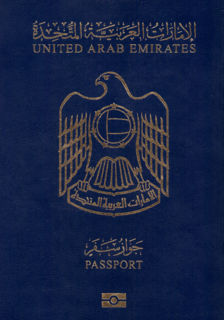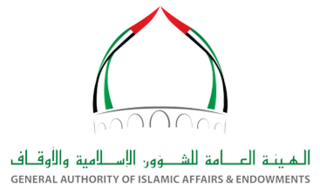 W
WPolitics of the United Arab Emirates take place in a framework of a federal presidential elective constitutional monarchy. The United Arab Emirates (UAE) is a federation of seven constituent monarchies: the Emirates of Abu Dhabi, Ajman, Dubai, Fujairah, Ras al-Khaimah, Sharjah, and Umm al-Quwain.
 W
WThe Constitution of the United Arab Emirates provides a legal and political framework for the operation of the United Arab Emirates (UAE) as a federation of seven emirates. The Constitution came into effect on 2 December 1971 and was permanently accepted in May 1996. Authored by Adi Bitar, a forming judge and legal advisor, the Constitution is written in 10 parts and has 152 Articles. The United Arab Emirates celebrates the formation of the Union as National Day.
 W
WThe Cabinet of the United Arab Emirates, more commonly called Council of Ministers, is the chief executive body of the United Arab Emirates (UAE). The first cabinet was formed following the union of the UAE as a federation in 1971.
 W
WThe Emirati passport is a travel document issued by the Ministry of Interior of the United Arab Emirates (UAE) to UAE citizens for international travel.
 W
WThe Federal National Council (FNC) of the United Arab Emirates (UAE) is an advisory quasi-parliamentary body in the UAE. The FNC consists of 40 members. Twenty of the members are indirectly elected by the hand-picked 12% of Emirati citizens who have voting rights through an electoral college, while the other twenty are appointed by the rulers of each emirate. According to Reuters, "the process of selecting the people who can either elect or be elected is opaque."
 W
WThe Federal Supreme Council is the highest constitutional authority in the United Arab Emirates, being the highest legislative and executive body. It establishes general policies and sanctions federal legislation. It is the First Federal Authority in terms of ranking in the hierarchy of the Five Federal Authorities prescribed in the Constitution: Federal Supreme Council, Federal President and Federal Vice President, Federal Cabinet, Federal National Council, Federal Judiciary.
 W
WThe Ministry of Foreign Affairs is a ministry of the United Arab Emirates, headquartered in Al Bateen, Abu Dhabi.
 W
WThe General Authority of Islamic Affairs and Endowments (GAIAE) or (Awqaf) is a federal agency of the government of the United Arab Emirates.
 W
WThe United Arab Emirates Armed Forces are the armed forces of the United Arab Emirates and have primary responsibility for the defence of all seven emirates. They consist of approximately 60,000 personnel, and are headquartered in Abu Dhabi, United Arab Emirates.
 W
WThe Ministry of Health and Prevention is the ministry of the Government of United Arab Emirates which is responsible for the implementation of health care policy in all areas of technical, material, and coordination with the Ministries of State, and cooperation with the private sector in health locally and internationally. The ministry is led by the minister, Abdul Rahman Mohammed Al Oweis.
 W
W"Ministry of State for Federal National Council Affairs, United Arab Emirates" As part of a multi-phased and gradual political reform process envisaged by the Government of the United Arab Emirates (UAE), the Presidential Federal Decree No. (10)/2006, amending Federal Law No.1/1972, created the Ministry of State for Federal National Council Affairs, headed by Dr Anwar Mohammed Gargash Al Awadhi, in early 2006. In fact, the ministry’s genesis could be traced to the National Action Program announced by UAE President Sheikh Khalifa bin Zayed Al-Nahyan in December 2005 to mark the 34th anniversary of the establishment of the UAE Federation. The plan included empowering the FNC in order to support the executive body. The strategic plan of the ministry also emanates from UAE Vice-President and Prime Minister and Ruler of Dubai Sheikh Mohammed Bin Rashid Al-Maktoum’s push for achieving sustainable and balanced development, as well as securing prosperity for the people of the country.
 W
WThe President of the United Arab Emirates, or the Raʾīs, is the head of state of the United Arab Emirates (UAE). The President and Vice-President are elected every five years by the Federal Supreme Council. Though the UAE Prime Minister is formally appointed by the President, every UAE Vice-President simultaneously serves as Prime Minister. Usually, a sheikh from the Emirate of Abu Dhabi holds the presidency, and a sheikh from the Emirate of Dubai the vice-presidency and premiership.
 W
WThe prime minister of the United Arab Emirates is the head of government of the United Arab Emirates. While not required by the UAE constitution, the practice is that the emir of Dubai serve as the prime minister and vice president of the UAE.
 W
WThis article lists the rulers of separate states on the territory of the United Arab Emirates, most of which became its Emirates.
 W
WAs part of the military of the United Arab Emirates, the United Arab Emirates Army is responsible for land operations.
 W
WVisitors to the United Arab Emirates must obtain a visa prior to travel unless they come from one of the visa exempt countries or one of the countries whose citizens are eligible for visa on arrival.